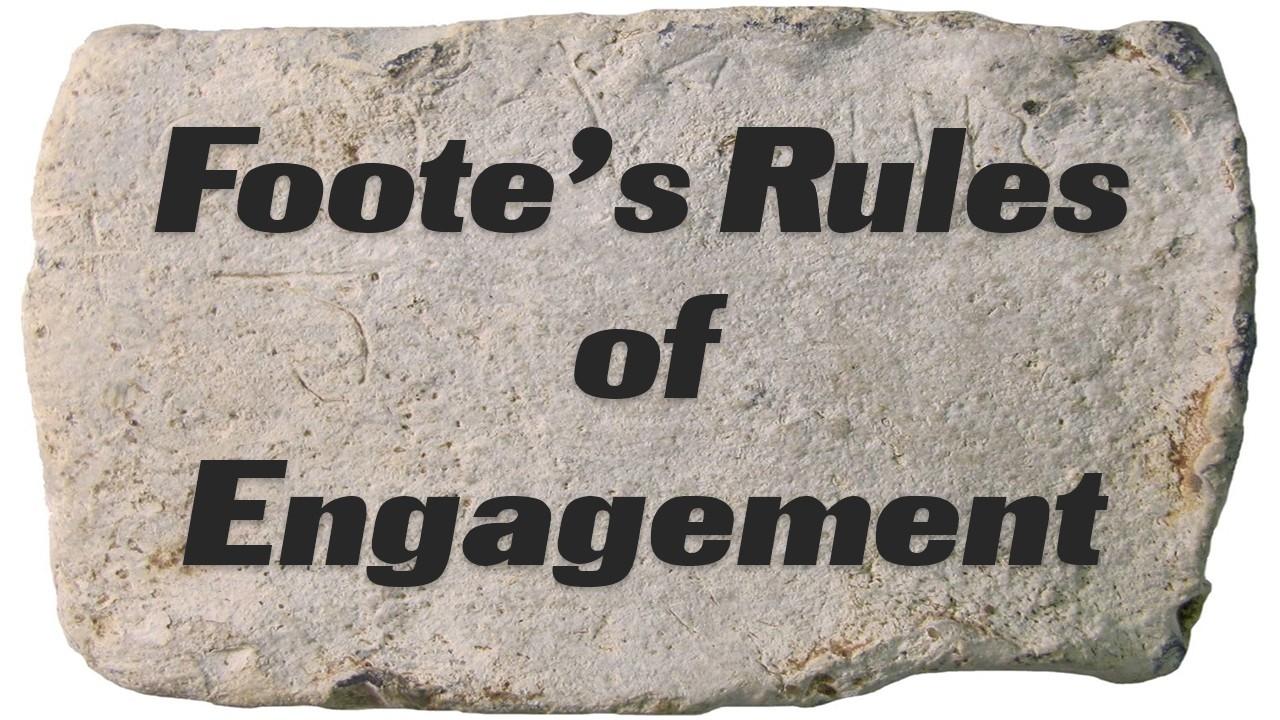Foote's Rules of Engagement

It's quite clear that as a profession we have a wide range of opinions and experiences on what our particular focus should be. In preparing my ACP (Academy of Chiropractic Philosophers) I came across a book titled "Chiropractic Peace" Executive Editor William P McDonald. The book discussed the differing views of the broad spectrum of chiropractic in an informative and mature fashion- I'd recommend it if you would like to understand the thinking of the other 'camps.'
Then I got to thinking about the mudslinging that occurs in the profession that more often than not continues to polarise views whenever the two ends of the spectrum meet.
Having successfully facilitated groups and clients for some years, I feel it would be appropriate to assist in you having conversations that are constructive and enlightening rather than inflammatory.
Personalise your opinion or observations.
Avoid making any universal statements such as,
“You know when you see a patient with XXX then you would do XXX.”
This implies that everyone does exactly what the statement said, which may not be the case and so will polarize anything further. Making ‘Universal’ style comments are to be avoided at all costs!
On the other hand, personalising a statement changes everything.
“I find when I see a patient with XXX then I would do XXX.”
This is the truth and doesn’t polarize the other person or make anyone wrong. The conversations that flow when two people personalize what they are saying can be the most amazing you can have. Remember you can never be wrong if you are personalizing what you are saying as no one else is an ‘expert’ in your experience- because only you know what you know!
Recognize hearsay for what it is…hearsay.
We all hear stories about other chiropractors whether it be from patients or our peers. It is human for us to paint a picture in our mind about what they do in practice EVEN THOUGH WE NEVER HAVE SPOKEN TO THEM OR BEEN IN THEIR PRACTICE! Let’s look at the people we are getting our information from;
Scenario: The patient you are seeing previously saw another chiropractor and told you about them.
The fact that they are seeing you rather than them tells us that they weren’t satisfied with the previous application of chiropractic. Often patients will ‘blame’ others for things that they themselves did or did not do.
- “I never got any results with him” could be “I didn’t do what was recommended.”
- “She wanted me to keep coming back” could be “I didn’t come in as often as was recommended.”
- “They were expensive” could be “I didn’t really budget for it.”
Scenario: The chiropractor you are talking to used to work with them.
- “They were really demanding” could be “I didn’t understand how much I would have to do.”
- “They were so focused on me needing to see more people” could be “I never appreciated what it cost to have an associate in a practice.”
- “They didn’t really help me grow my practice” could be “I never really asked for help.”
We have to be aware that everyone’s truth may be different depending on their perspective.
Be Curious
If there is a choice between being sceptical and being curious to learn more, embrace curiosity every time! It would be rather sad to consider that one knows everything there is to know. If you are listening to someone discuss their personal experience- understand that it is exactly that, their personal experience, which may be different to yours.
Don’t say anything about anyone that you wouldn’t also say to their face.
Science has shown that what we say about others who aren't present, results in the person you are talking to, thinking you do the same about them when they are absent. This can be both positive and negative. Speak ill of someone and the person you are talking to will consider that you will speak ill of them. Say good stuff about others and they will think you sing their praises when they aren’t there.
(I can't help but think that many of these 'faceless keyboard warriors' would have a hard time in following this one as they pump out their relentless cowardly comments from afar.)
Avoid the question ‘why’ when asking questions.
When someone is asked the question WHY it often invokes an emotional reaction resulting in the person coming up with an excuse, justification or a story. When someone uses these it often entrenches them into their view and increases the chance of polarizing views.
Here’s the workaround- replace WHY with ‘What makes you say that?’
The focus then comes away from justifying their views to describing the context or the series of events/experiences that lead to the action being made. This allows the other person to better understand the decision making and opens the conversation up further.
That's it.
Next time you are at a conference, a meeting or a workshop and you have an opportunity to discuss differing viewpoints consider asking them to use these rules of engagement, and you may very well find out that the other person is real, quite nice, has good intentions and due to a number of circumstance has developed a differing point of view.


